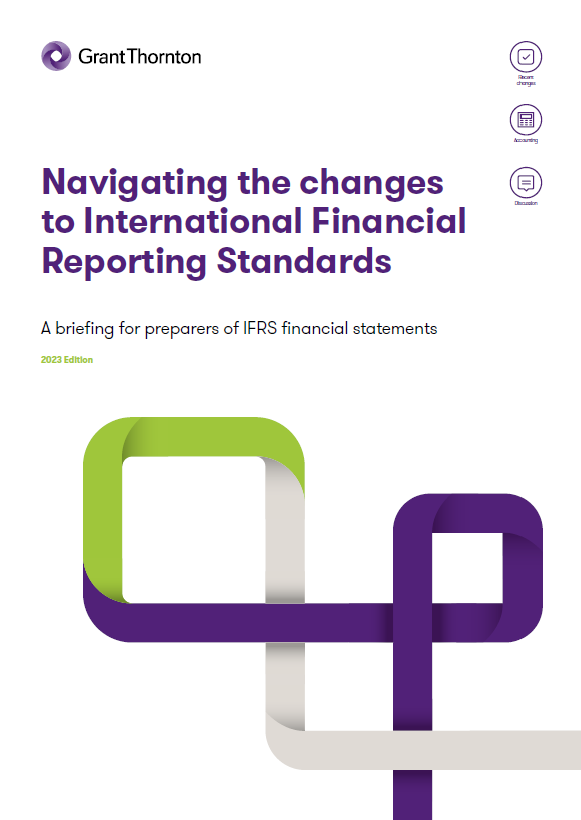-
Audit methodology
At Grant Thornton, we use a single audit methodology across our global network. This means that our clients gain the same proven, high-quality approach wherever they are.

-
Financial statements and consolidated financial statements
Preparation of monthly, quarterly or annual report and consolidated report on the basis of information presented by the client.
-
Financial Accounting
Effective bookkeeping and financial accounting are essential to the success of forward-thinking organisations. To get the optimum benefit from this part of your business, you'll need an experienced team behind you.
-
Tax compliance
Tax is likely to have an impact on almost every business decision you make. Whatever your business’s specific needs, we respond quickly and devise solutions tailored to you. We perform VAT, income tax, social tax and other tax accounting as well as present tax declarations to the tax authorities.
-
Chief financial officer service
Chief Financial Officer services include the periodic reporting, information systems standardization, internal document management and information flow optimization, budget preparation, cost accounting, cash flow and working capital management, financial analysis, investment return evaluation for managers.

-
International taxation
Grant Thornton operations in the Baltic States give us an access to the international expertise and allow advising the client on the minimisation of tax risks arising from conducting business in a foreign tax jurisdiction. We also consult foreign investors in finding an optimum group structure and form of enterprises in Lithuania and other Baltic States.
-
Transfer pricing
We advise the management bodies of local and multinational groups of companies in issues concerning transfer pricing of intra-group transactions and, if necessary, in the preparation of the relevant compliance documents. We also assist in preparing transfer pricing policies in order that future transactions are priced in accordance with the local as well as international regulations.
-
VAT refunds
We advise foreign clients in issues concerning the refund of value added tax paid in Lithuania, and Lithuanian clients – in the refund of value added tax paid in the EU member states. If necessary, we carry out these procedures on behalf of the client.
-
Profit tax, tax incentives
Our tax advisory department consults local and international clients in both everyday and specific taxation issues related to business activities.
-
Due diligence
Making the right investment decision can have a significant impact on shareholder value. To make an informed investment decision and create the best value from the transaction you will need the following an understanding of the target business identification and understanding of key business drivers an understanding of all the relevant issues clear analysis, conclusions and recommendations.
-
Assistance and representation during tax investigations, inspections, disputes
We provide services for registration in the Register of Taxpayers and the Register of VAT Payers. We represent clients' interests in tax disputes at the State Tax Inspectorate, Tax Disputes Commission, courts and other institutions.

-
Legal advisory for business start
We assist to quickly establish a company, branch or permanent establishment in Lithuania, open a bank account, VAT registration and obtain all necessary licenses for activity.
-
Legal advisory for business development
Our team has gained the greatest experience in advising international companies on the management of groups of companies. We advise and implement reorganizations or liquidations. Together with a team of tax and financial advisors, we perform a comprehensive due diligence (tax, legal & financial).
-
Labor law for CEOs and employees
We provide modern labor law solutions for the CEO, C-level managers and employees, which are tailored specifically to your business industry. We will take care of well-judged employment contracts and benefits package, protection of confidential information and non-compete agreements, handling of employee data or stock option rules, posting of employees, employment of EU and third-country nationals, organization of telework.
-
Fintech
With extensive experience in money laundering prevention and compliance and a strong team of financial experts, we advise clients on financial services, electronic money, licensing of payment institutions, capital formation, listing of mutual lending platform operators and other operational issues.
-
Migration and relocation
We assist you, your family members and employees of the organization to obtain national and European Union (Schengen) visas, residence permits, e-resident status, provide mediation letters and ensure a smooth relocation to Lithuania.
-
Due diligence
Making the right investment decision can have a significant impact on shareholder value. To make an informed investment decision and create the best value from the transaction you will need the following an understanding of the target business identification and understanding of key business drivers an understanding of all the relevant issues clear analysis, conclusions and recommendations.
-
Fintech advisory
The rapidly changing world and evolving technology are driving the development of new business models such as acting as a payment institution, a provider of virtual currency services and a financial institution. Grant Thornton Baltic provides support and advice to these companies.
-
Corporate finance management
Building a successful business requires a clear vision backed by a focused strategy. To achieve this vision, businesses must negotiate an increasingly complex environment.
-
Business Valuations
Choosing the right valuation method is the most important element in the process of estimating the fair value of a business as it must be adequate in terms of the purpose and object of the valuation. Grant Thornton uses only proven and generally accepted methods from among the wide range of income, asset and market approaches. Having conducted a preliminary analysis of the object and purpose of the valuation, we identify the method that will be the most appropriate considering the situation and characteristics of a given enterprise and the business sector in which it operates. Prior to commencing valuation, we also identify the documents necessary in the process.
-
Mergers and acquisitions
We provide advice to clients in all material aspects of the process of conducting transactions: finding a candidate for buyer, purchase or merger, initial analysis and valuation, negotiations, due diligence, structuring transaction price, preparing legal documentation and formal closing of the transaction. We also provide consultation for management buyouts.
-
Protection of Interests of Bondholders'
Grant Thornton provides bondholders' advocacy and protection services. We have resources, knowledge and the latest technology. Defending the interests of bondholders · Representing the interests of bondholders
-
External Financial Management Services
Providing an external financial management services makes it possible to manage a company’s finance on a day-to-day basis by a competent economist, without the need of offering full-time employment. By cooperating with experts on managing big-budget projects, we provide our clients with excellent support in comprehensive management of company’s finance.
-
Training
Financial Management Training and Seminars. Our experts have significant regional competence and close co-operation with our global colleagues. They happily share their expertise with our clients.

-
Internal Audit Services for Financial Sector Companies Licensed in Lithuania
Internal audit services adapted to Lithuanian financial sector companies ensure compliance with regulatory acts, risk management and operational excellence.
-
Internal Audit Services for EU/Foreign Aid Projects
Internal audit for EU/foreign aid fund projects helps to ensure compliance of activities and related costs with requirements.
-
Internal Audit for the Companies Certified by ISO
Internal auditing ensures ISO standard compliance, evaluates management system effectiveness, and gathers objective evidence of performance.

Law on ensuring the minimum level of taxation of groups of entities - Qualified Domestic Minimum Top-up Tax (QDMTT)
As of July 1, 2024, a new law adopted by Parliament came into force, implementing the European Union's Pillar Two directive. This law mandates a minimum effective corporate tax rate of 15% for groups of companies with annual consolidated revenues of EUR 750,000,000 or more in at least two of the four financial years immediately preceding the audited financial year.
International groups operating in a country with a corporate tax rate of less than 15% on profits earned must pay an additional tax to meet this minimum standard.
The project does not impose taxation, so companies in Lithuania, whether they are part of a group of companies registered in Lithuania or a group of companies based abroad, will not pay additional tax for 2024. The surtax will be paid in the country where the European Union (EU) Directive is fully implemented.
- Multinational groups with a Lithuanian ultimate parent entity must ensure that all necessary data on taxable entities in other EU Member States are provided in accordance with Directive (EU) 2022/2523.
- The ultimate parent entity in Lithuania must designate a reporting entity in an EU Member State to file the surtax return within 15 months of the end of the financial year.
- If the group has no taxable entities in the EU, the designated entity must be located in a third country with which Lithuania has an agreement.
- Taxable entities in Lithuania have 13 months from the end of the financial year to submit the necessary data to the designated entity and the State Tax Inspectorate. The data includes identification data, organizational structure, tax rates and options under Directive (EU) 2022/2523.
- If a group is falling within the scope of this law for the first time, the declaration must be made within 18 months of the end of the financial year. The data must be submitted within 16 months.
- The ultimate parent entity in Lithuania must notify the State Tax Inspectorate of the designated reporting entity.
- The State Tax Office will determine the details of the reporting in accordance with the provisions of Directive (EU) 2022/2523
More information can be found here.
On September 19, 2024, the Ministry of Finance drafted laws to fully implement the EU Directive on a minimum tax for large corporate groups, introducing a new tax for companies with revenues over EUR 750 million. The law is set to take full effect on January 1, 2025, if approved.
More information can be found here.
Income tax changes
Acceptance of an investment account
On June 25, 2024, Parliament adopted amendments to the Law on Personal Income Tax, introducing a new investment account, effective from January 1, 2025. This account will offer greater flexibility in managing investments, as residents' income will not be taxed until funds are withdrawn. It will also allow for the consolidation of gains and losses, and investment accounts can hold financial products received as gifts or inheritances. The tax rates remain unchanged: 15% for personal income and 20% for income exceeding 120 times the average wage.
More information can be found here.
Law on adjusting the procedure for declaring the income and assets of residents
The amendment to Article 27 of the Law on Personal Income Tax introduces new rules that significantly affects residents with a sole proprietorship or a business license. The main changes:
- Compulsory declaration: a person who has obtained a business license or registered an individual activity must submit an annual income tax return even if he or she does not receive any income from the activity.
- Obligation to declare under the Electoral Code: Residents who are obliged to declare their income or assets under the provisions of the Electoral Code and the Law on Declaration of Residents' Assets are also obliged to submit an annual income tax return. This applies to residents who make donations to political parties, candidates or are involved in election campaigns.
- Declaration of income in case of donations: if a resident makes donations after 1 May, he/she must submit a declaration for the last tax period. If before 1 May, for the previous tax period. This adds an additional declaration procedure for political donations.
- Declaring assets: people who are required to declare their assets must submit their annual income tax return by 1 May. This is important to ensure transparency and compliance with the law on asset declaration.
The law enters into force on 31 May 2024
More information can be found here.
CIT changes
The amendment and supplementation of Corporate Income Tax No IX-675
This amendment to the law, which will enter into force on 1 January 2025, updates corporate tax rates and rules. The amendments include:
- Corporate tax rates - the standard rate will be 16%, with small companies (up to 10 employees and up to €300,000 in revenue) taxed at 0% in the first year of operation and 6% in subsequent years.
- Car costs - new criteria for the deduction of car depreciation and rental costs based on CO2 emissions:
-
- If 0g/km CO2 – 75t. EUR
- If ≤130g/km CO2 – 50t. EUR
- If >130g/km CO2-≤200g/km CO2 – 25t. EUR
- If >200g/km CO2 - tik 10t. EUR
- Dividend taxation - Dividends from both Lithuanian and foreign companies will be taxed at 16%.
- Loss carry-forward option is extended.
These changes will apply to the calculation and declaration of corporate tax for 2025 and subsequent years.
More information can be found here.
Changes to value added tax
Change to VAT rounding
The amendment specified in Article 15, Part 24 of the Law on Value Added Tax (VAT) of the Republic of Lithuania will come into effect on May 1, 2025. This amendment stipulates that when the final amount for goods or services, including VAT, is rounded according to the Law on the Rounding of Cash Payments, the taxable value of the goods or services will be the value calculated before rounding, excluding VAT.
The law on the rounding of cash payments applies only to cash transactions. According to this law, rounding will not apply to non-cash payments, such as those made with credit cards, gift vouchers, loyalty cards, or other social cards, as well as wages, pensions, and taxes.
More information can be found here.
Simplification of VAT invoicing for financial institutions and VAT payers
VAT invoicing for financial institutions:
- The previous regulation allowed financial institutions to issue a VAT invoice for VAT-exempt services but did not specifically define the terminology or conditions.
- The new version states that financial institutions may issue a single VAT invoice during the calendar year for non-taxable services specified in Article 28 of the Value Added Tax Law. This invoice must be issued by January 10 of the following year.
Issuing a VAT invoice for fuel used for private needs:
- The previous regulation did not clearly address the issuance of a single VAT invoice for fuel used for private purposes..
- The new edition establishes that VAT payers may issue a single VAT invoice for fuel consumed during the year for private purposes. This invoice must be issued by January 10 of the following year.
The changes take effect on March 20, 2024.
More information can be found here.
Amendments to the Law on Tax Administration
Amendments to the Law on Tax Collection and Administration
The changes to this law address several key areas related to tax administration, enforcement, and collection. Here’s an overview of these changes:
Taking over tax arrears (applicable):
- The new wording permits the tax administrator, in accordance with procedures set by the central tax administrator, to allow other parties to assume the taxpayer's tax arrears. Transferees are subject to the same provisions as the taxpayer concerning the payment and recovery of arrears.
Extension of foreclosure (applicable):
- The amendment includes provisions that establish the right to enforce the recovery of unpaid economic sanctions, fines for criminal acts, and sums awarded by the court.
Tax arrears recovery procedure (effective June 30, 2026):
- It has been amended that tax arrears can be enforced by various methods, including instructions to credit and electronic money institutions, guarantors, guarantors and enforcement of mortgaged property.
- Included are clauses on the terms and procedures for forced recovery of tax arrears, as well as on recovery from other states.
More information can be found here.
Regarding the change in the method of submitting tax returns and the procedure for telephone counseling
Method of submission of declarations:
- Tax declarations must now be submitted exclusively electronically through the Electronic Declaration Information System (EDS) of the State Tax Inspectorate, except in specific cases outlined in the regulations.
- Paper declarations will not be accepted and will be considered not submitted if there are no exceptions provided by legislation.
- Declaration adjustments must also be made electronically.
Telephone consultation procedure:
- A representative of the tax administrator can fill out the declaration based on the information provided by the taxpayer, if such a service is provided by State tax inspection.
- Telephone conversations regarding counseling and declaration filling are recorded, and the taxpayer can obtain copies of these recordings in accordance with the established procedure.
The changes take effect on July 4, 2024
More information can be found here.
| DOWNLOAD PDF [ 718 kb ] |

